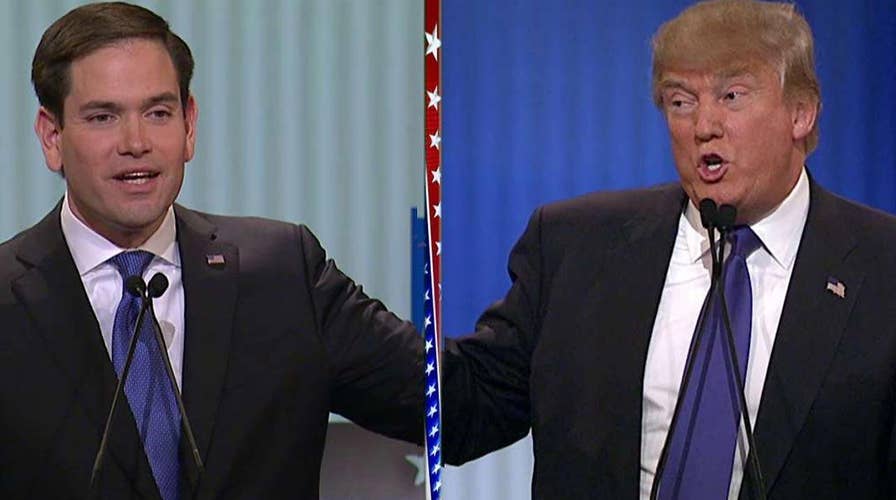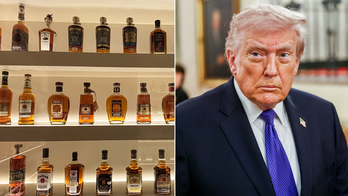Part 2 of the Fox News GOP presidential debate in Detroit
Candidates clash over federal spending, immigration at the #GOPDebate
Donald Trump’s rivals teamed up at Thursday’s Fox News Republican presidential debate in a concerted effort to cast him as a political salesman willing to say anything and take any position to win the nomination – but in the end, pledged to support the GOP nominee, even if it's Trump.
Marco Rubio, Ted Cruz and John Kasich all pledged to support the eventual nominee. And Trump, who has occasionally threatened to mount an independent bid, also vowed, “Yes, I will” support the nominee.
The moment of unity in Detroit was a break from the otherwise tense and personal debate. At other times, the Republican front-runner repeatedly was challenged, by the moderators and his rival candidates, on his alleged inconsistencies.
Trump defended his statements, one after another – for instance, saying “I changed my tune” from welcoming Middle East refugees to suggesting the U.S. can’t take them, after learning new information.
“I have a very strong core," he said, while adding: “I have never seen a successful person who wasn’t flexible.”
But his rivals argued this “flexibility” raises questions about whether Trump really would deliver on his promises.
“There’s a difference between flexibility and telling people whatever you think you need to say to get them to do what you want them to do,” Rubio charged, claiming once again that Trump is “trying to con people.”
Ohio Gov. Kasich, without naming Trump directly, suggested voters are tired of politicians telling them “what they want to hear” and not delivering.
At other times, Trump was kept busy swatting down attacks on his character, his readiness to be president and his business record.
“He has spent a career convincing Americans he’s something that he’s not in exchange for their money," Rubio said of the front-runner.
“This little guy has lied so much about my record,” Trump answered. “... You haven’t employed in your life one person. I’ve employed tens of thousands of people.”
The sustained attempt by the three other candidates to challenge Trump’s authenticity comes as they scramble to disrupt his march to the nomination – following the Super Tuesday contests where Trump padded his sizeable delegate lead.
Once again, the debate saw Cruz and Rubio hitting Trump from both sides – including pressuring him to release a reportedly secret tape of him speaking bluntly about his immigration policies to the New York Times editorial board.
Trump said he’s not going to release the tape. He admitted he’s “changing” and “softening” his position on certain visas for highly skilled workers, but said he’s also “not very flexible” on his proposed U.S.-Mexico border wall.
Cruz called the Times tape issue “troubling” and questioned whether he told the editorial board he doesn’t believe what he says on immigration.
“You can resolve this issue very quickly by simply releasing the New York Times tape,” he said, questioning whether he’s “lying” to the public.
“You’re the liar,” Trump said. “I’ve given my answer, lyin’ Ted.”
Trump also tangled with Cruz after accusing Cruz of being the primary supporter of Supreme Court Chief Justice John Roberts.
Cruz rejected the claim, and when Trump tried to interrupt, said, “Breathe, breathe, breathe.”
Rubio quipped, “When they’re done with the yoga” -- and when brushed off by Cruz, added: “Well, [Trump is] very flexible, so you never know.”
Trump also moved to deflect criticism about his former Trump University, which is the subject of several court cases. He called them a “minor civil case” he could settle.
This led to another tense exchange with Cruz, who said, “Donald, learn not to interrupt … count to 10.”
Kasich, meanwhile, defended his campaign, claiming he’ll turn it around soon – and would earn “crossover votes” in a general election.
Cruz also confronted Trump over his past financial contributions to Hillary Clinton’s campaigns – challenging his decision to send four checks for her 2008 presidential bid.
“Why did you write checks to Hillary Clinton to be president in 2008?” Cruz asked. “It wasn’t for business.”
Trump countered, though, that “it was for business.”
“We’re doing many, many deals outside of the United States,” Trump said, justifying his donations to Clinton’s 2008 campaign.
But he said he also supported Ronald Reagan and other Republicans and maintained that the “last person” Clinton wants to face in November is him.
Trump faced off Thursday against a narrowing field of Republican rivals, as his battle with the GOP ‘establishment’ hit new levels of intensity. Just hours earlier, 2012 GOP presidential nominee Mitt Romney ended any semblance of sitting this one out and delivered a scathing speech against Trump’s candidacy. The address, in which Romney called Trump a “phony” who would sink the country into recession, underscored how divided the party truly is over Trump’s rise.
Trump, at the top of the debate, hit back at Romney,, calling him an “embarrassment” and asserting he’s just trying to get “back in the game.”
“He was a failed candidate. He should have beaten President Obama very easily,” Trump said. “I guess he wants to be relevant.”
Rubio, meanwhile, defended his shift to leveling personal attacks at Trump – which he started doing at the most recent debate.
“Donald Trump has basically mocked everybody with personal attacks,” he said. “If there’s anyone who’s ever deserved to be attacked that way, it’s Donald Trump.”
Rubio, though, said he’s ready to get back to the issues.
Trump then made an off-color joke when responding to Rubio’s jab at his supposedly small hands.
“He hit my hands. Nobody has ever hit my hands. .. If they’re small, something else must be small. I guarantee you there’s no problem.”
Despite resistance to Trump from senior GOP figures, Super Tuesday showed primary voters once again breaking in huge numbers for Trump’s campaign – delivering him seven state victories out of 11 and building his already-substantial delegate lead over his rivals.
The field thinned again after Super Tuesday, with retired neurosurgeon Ben Carson saying he sees no path to the nomination and – while stopping short of suspending his campaign – sitting out Thursday’s debate in Detroit.
Each of the remaining candidates is continuing to campaign, undeterred by Trump’s dominance on Super Tuesday and his delegate lead.
Cruz won three states, including his home state of Texas, on Tuesday. Rubio won his first, in Minnesota. Kasich has not won any, but is banking on his home state’s primary on March 15.
Cruz has openly applied pressure on the two other candidates to consider dropping out, arguing that he is the only candidate who can take on Trump in the remaining primary contests.
Rubio, though, has enjoyed substantial support from fellow GOP lawmakers and is banking on a comeback in his home state on March 15 as well.













































